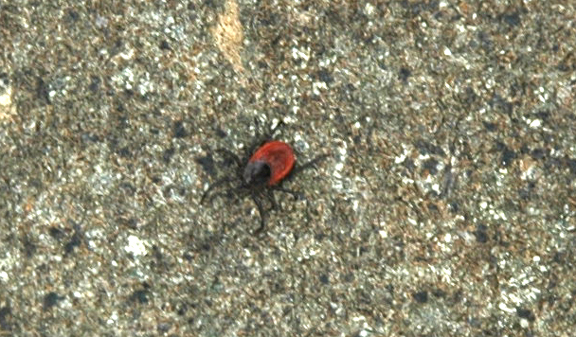
![]()

The Western Black-legged Tick: A potentially dangerous mite since its bite can transmit Lyme disease and, on rare occasions, other infectious diseases.
The Western Black-legged Tick: Ixodes pacificus
If you spend any amount of time outdoors, it is important to be wary of potential tick bites. Though not common, tick bites do occur on Vancouver Island and have been known to transmit diseases, especially Lyme disease. From firsthand experience I can tell you that ticks do occur on North Vancouver Island. The one in the photo above was removed from a child camping in the Buttle Lake area of Strathcona Park. Ticks will also attach themselves to your pets if given a chance. Dogs, like humans, are susceptible to Lyme disease so it is important to check your pets and remove any ticks that may be attached to them.
According to the Public Health Agency of Canada, there are several precautions you can take to protect yourself from ticks:
(1) Limiting your skin exposure to ticks by wearing protective clothing such as long sleeve shirts that are tucked in and long pants tucked into boots.
(2) Use insect repellents containing DEET on clothes and exposed skin. It is effective in turning away ticks.
(3) Do daily body inspections of children and pets. Ticks inject an anaesthetic when they bite so you or your kids may not know you have been bitten. This is particularly important because removing ticks early dramatically reduces the chances of infection.
If you are bitten by a tick, use tweezers to remove the tick by gently pulling on the head. Do not tug on the body as it may break off leaving the head or other parts embedded under the skin, increasing chances of infection. If you can, keep the tick in a plastic vial or Ziploc bag in case a rash develops at a later date. At any rate, if you are bitten by a tick, please visit the Public Health Agency of Canada website below or consult your doctor to learn more about the risks and signs of Lyme disease.
References: See the Public Health Agency of Canada for more information on ticks and Lyme Disease.
